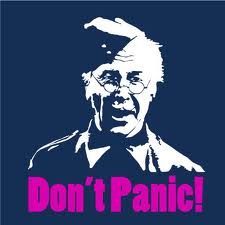 |
| MDGs |
Confused? Everybody is, but few readily admit it. The ferment of the international development community currently resembles a giant boiling cauldron, sizzling with acronyms and spiced with speculation. Large bubbles emerge below the steam and periodically burst, coughing out of the plasma another possibility of what the world might look like after the fabled date of 2015 and sends everyone scurrying to their keyboards to bash out a policy response, and consult with their consortia.
As Skype calls span the world, carrying the anxious conversations of thousands in civil society, it’s sometimes worth sitting back and surveying the scene, if only for the comedy value. It reminds me of Lance Corporal Jones of the British sit-com Dad's Army who used to run around at times of crisis crying "don't panic"!
 |
| Civil Society engages with the post 2015 agenda |
For the last few months I have been looking into what’s going on between now and the time that the Millennium Development Goals expire, in 2015. Not long now, and the tension is mounting, it seems.
The MDGs were agreed at the turn of the century and were conceived in a very different world. 9/11 was still 18 months away and Afghanistan was a little thought of country somewhere north of Pakistan for most people. Iraq hadn’t happened and the world had just about recovered from the 1997-1998 financial crisis two years before with the prospect of a 2008 style crash unthinkable.
In 2005 we had the Make Poverty History campaign with tens of thousands lining the streets and cramming into rock concerts designed to force the recalcitrant G8 leaders, the rulers of the world it seemed, to commit to urgent action to do just that. Commit large enough sums of money and those babies that kept dying as Bono clicked his fingers on the stage to illustrate the mortality rate would simply stop dying. People would be fed. And housed. And clothed. And happy.
 |
| Bono clicked, babies died |
Except even they seem hamstrung when it comes to agreeing what to do about the current crisis contracting the world.
Put that together with an American election that might return a Republican administration deeply suspicious of the idea of aid as a principle, and the ongoing turmoil that threatens the very existence of one of the world’s biggest economic blocs in the form of the Eurozone, and you have what might be considered a somewhat difficult environment in which to decide how best to donate taxpayers money to end poverty in poor places that voters have never heard of.
The response, thus far, seems to be a complete lack of coherence from those who should know much, much better. The Rio+20 conference, so-called since it took place two decades after its 1992 predecessor, was ostensibly about the environment but was actually an attempt to redefine the global consensus on what development should actually be all about. Led by countries like Colombia, Guatemala and Brazil this was an attempt to define the next generation of what international development should look like. MDGs 2.0, if you like.
It failed.
We were left with the apparent establishment of an Intergovernmental Group of 30 countries who will, somehow and at a timescale not yet published, define the content of Sustainable Development Goals that aim to establish both a social floor below which no citizen of the world should be expected to live (think more detail than a dollar a day but along those lines) and an environmental ceiling above which it would be hazardous for economic growth to stray (so growth that doesn’t over-use or deplete natural resources)
 |
| Rio+20: Home-time prompted wild celebrations |
The second is the process started under the auspices of the UN Secretary General which is about considering a successor to the MDGs themselves. In recent months this strand has seen an explosion of activity. Roundtables, thematic consultations, regional consultations and numerous reports have been flooding out of the UN system and reverberating around the world, themselves provoking even more consultations from the various cogs of the global governance system as they consider how to play their hand. I am currently assisting in a response to a European Commission consultation, for example.
Consultation is good. It’s good to talk. But where are all of these conversations headed and how will what people have said they want be taken into account, pulled together, made whole?
Ah, says the UN, that’s the job of the High Level Panel of world leaders jointly chaired by British Prime Minister David Cameron, Liberian President Ellen Johnson-Sirleaf and Indonesia’s President Yudhoyono. Sounds good – northern leaders uniting with their southern brethren in a common endeavour to reshape the world for the common good.
 |
| High Level Panel |
So we have, apparently, two global processes which are both concerned with basically the same set of issues but with competing ideas of how those issues should be tackled. They both involve the same set of governments around the world – donors and donees – and will in both cases be subject to the vagaries of the global power games that always accompany any such process.
In other words we are in an environment it would be hard to imagine being any tougher for this sort of debate to take place, politically never mind economically, and what is the UN system allowing to happen? For everyone to be divided into two competing camps consisting of the same people.
What could possibly go wrong?
No comments:
Post a Comment